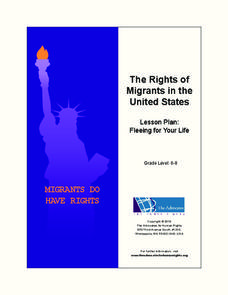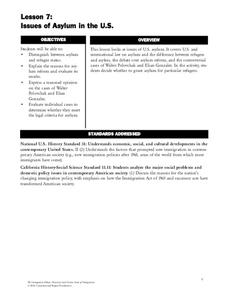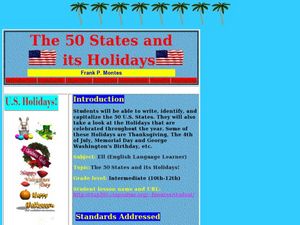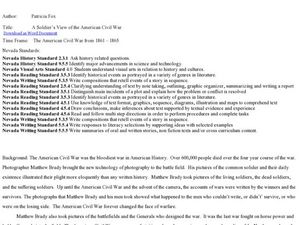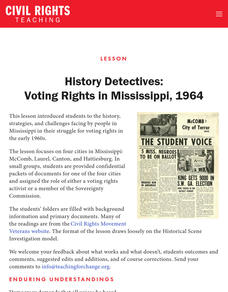PBS
African American History: Climbing the Wall
Imagine the challenge of trying to trace your family genealogy if no records were kept of births and deaths. Where would you look for information? What types of documents could provide you with the information you seek? History...
Federal Reserve Bank
History of Money and Banking in the U.S.
Why was there a lack of confidence in the money and banking system of the early United States government? What historical events led to the establishment of the Federal Reserve System? Here you'll find reading materials and worksheets to...
A&E Television
Thomas Jefferson: Teachers Guides
Thomas Jefferson remains one of the most fascinating figure in American history, both for his innovative contributions to the United States government and his remarkably contradictory personal life. A series of discussion questions and...
American Battlefield Trust
United States Colored Troops
The debate over slavery contributed to the Civil War, but it didn't stop African Americans from joining the military. Academics complete a series of worksheets, read original letters, and analyze a photo of an African American soldier to...
Curated OER
Slave Narratives: Constructing U.S. History Through Analyzing Primary Sources
Learners access oral histories that contain slave narratives from the Library of Congress. They describe the lives of former slaves, sample varied individual experiences and make generalizations about their research in journal entries.
iCivics
You've Got Rights!
If aliens invaders nearly destroy the world in the distant future and leaders must decide on a pamphlet of protections to preserve individual rights, what should they include? Introduce the Bill of Rights and the struggle between the...
Advocates for Human Rights
The Rights of Migrants in the United States Lesson Plan: Fleeing for Your Life
A role-playing scenario has middle-schoolers imagining that they are refugees forced to flee their community and integrate into a new one. Then, some play the roles of members of the new community and the class brainstorms ideas about...
Constitutional Rights Foundation
270 Votes to Win: The Electoral College in the United States
What exactly is the Electoral College and how does it work? The lesson is part of a larger series on government that explains what the Electoral College is and how it helps determine an election winner. Academics participate in...
Curated OER
Puerto Rico: The 51st State?
Students explore Puerto Rico. For this Puerto Rico current events lesson, students conduct a Webquest to answer questions about Puerto Rico's culture. Students discuss whether Puerto Rico is a country or a state, and defend...
Smithsonian Institution
Cuban Missile Crisis
The United States—specifically John F. Kennedy—played a large role during the Cuban Missile Crisis. A history resource poses questions that encourage critical thinking as well as in-depth analysis of images from the time period.
National Endowment for the Humanities
James Madison: Madison Was There
Madison was there! Scholars go on a journey to discover the person behind the founding father label as they explore James Madison's role in the formation of the United States government. The culmination is a writing assignment and...
Constitutional Rights Foundation
Refugees from the Caribbean: Cuban and Haitian “Boat People”
Should refugees fleeing poverty be allowed the same entrance into the United States as those fleeing persecution? High schoolers read about US foreign policy in the late 20th century regarding refugees from Cuba and Haiti, and engage in...
Constitutional Rights Foundation
Plyler v. Doe: Can States Deny Public Benefits to Illegal Immigrants?
Illegal immigration is an ever-changing source of consistent controversy. A reading passage about the rights of undocumented workers and illegal immigrants—and the lack thereof—guides high schoolers into a mock trial activity. Three...
Constitutional Rights Foundation
Issues of Asylum in the U.S.
Who gets to come to the United States? Examine cases of individuals seeking asylum with an informative reading passage that includes examples, statistics, and representations of public opinion regarding asylum. Groups then go on to...
Curated OER
The 50 States and its Holidays
Though the format of this ELL lesson is confusing (the standards listed are for plate tectonics, yet the objectives are for American geography and holidays), a teacher could glean some ideas from the main idea. Here, pupils complete a...
Curated OER
The American Currency Exhibit
Examine the historical structure, the purposes, and functions of the United States monetary system. Your class engages in a scavenger hunt to compare U.S. currency notes from specific eras throughout U.S. history. They work to identify...
Anti-Defamation League
Impact of the U.S. Expansion on Indigenous People and Stereotypes About Native American People
The 2004 U.S. bicentennial sparks a discussion about its meaning and importance to United States history. Readings, maps, tables, and reflective writing prompt small groups to explore the westward expansion, Lewis and Clark, and how...
West Virginia Department of Education
Declarations and the Quest for Life, Liberty and the Pursuit of Happiness
Understanding how John Brown got his inspiration from the Declaration of Independence helps learners further understand both West Virginia and United States history. The resource, a standalone, uses worksheets, discussion, and essay...
National Endowment for the Humanities
The Creation of the Bill of Rights: “Retouching the Canvas”
While the Constitutional Convention lay the foundation of the new government for the United States, the protections given under the Bill of Rights were controversial. Using documents, such as James Madison's and Thomas Jefferson's...
Curated OER
A Soldier's View of the American Civil War
Study and research the American Civil War in this explanatory writing instructional activity. Middle schoolers complete six activities to learn about the American Civil War and soldiers' views of the war. The instructional activity...
TCI
Ain't I a Woman?
Learners discover the impact of women on civil rights in United States history by analyzing primary source clues to identify influential female figures.
Digital Public Library of America
Teaching Guide: Exploring To Kill a Mockingbird
Harper Lee's To Kill a Mockingbird, considered by many to be a seminal piece of American literature, contains many complex literary themes that carry through United States history. Use a series of discussion questions and classroom...
Facing History and Ourselves
A Contested History
Memories of and interpretations of history change—that's the key takeaway from a lesson that has young historians compare the story of the Reconstruction Era as told by the historians of the Dunning School to the view of scholars today...
Teaching for Change
History Detectives: Voting Rights in Mississippi, 1964
Promises made and promise broken. Spies and activists. Voting rights in Mississippi are the focus of a lesson that has class members research the history of the struggle in Mississippi. Learners take on the role of voting rights...
Other popular searches
- United States History 1920s
- United States History 1900's
- United States History 1700's
- United States History Essays
- Ap United States History
- Media United States History
- United States History K 2
- History of United States
- United States History Exam
- United States History Colonial
- United States History Units
- United States History Timeline








